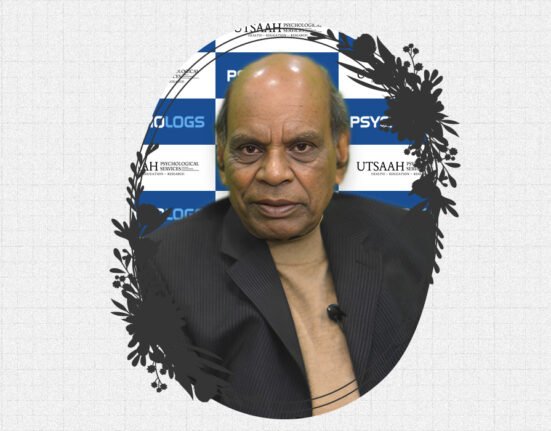We pay tribute to Professor Anand C. Paranjpe with utmost sorrow and utmost respect, a great figure of Indian psychology whose legacy still charts the limits of theoretical and cross-cultural psychology. His life was a miraculous journey, one that reached across science and philosophy, East and West, modernity and tradition. In mourning the passing of this great scholar, educator, and philosopher, we also celebrate his vast contributions and lasting legacy to the scholarship of Indian psychological thought.
Early Life: Physics, Philosophy, and Nationalism
Anand Paranjpe’s route into psychology was not quite from a textbook. University studies first got underway in the fields of physics and cosmology, not psychology, but at the same time, he read Western philosophy from Plato to Kant. But intellectual stimulation was not confined to the lecture theatre. He graduated and became a member of an Indian nationalist volunteer movement and was away from active work for intervals, living among poor and underprivileged rural village folk.
It was a transformative experience. Being among the poor and oppressed awakened within him a robust sense of nationalism, not political theory, but a humanist longing for justice and compassion. It was this sense of ethical responsibility and intellectual curiosity that led him to psychology, for he wanted to examine not just the mind but the state of humankind in a profoundly embedded cultural context.
Crossing Borders: A Postdoc with Erik Erikson at Harvard
Prof. Paranjpe’s intellectual pilgrimage was dramatically altered by his meeting with Erik Erikson—the celebrated psychoanalyst whose psychosocial theory of development is accepted everywhere in the world—when Erikson made one of his visits to India. This meeting led to an invitation to join Erikson at Harvard University as a Fulbright and Smith-Mundt sponsored postdoctoral fellow.
During his time at Harvard, Paranjpe was privy to some of the brightest minds in 20th-century psychology, including personality psychology founder Gordon Allport and obedience trailblazer Stanley Milgram. But while his tutors set about exploring the universal dimensions of psychology, Paranjpe’s mind was already set on building a different picture—one that could bring Indian philosophical thinking into dialogue with pertinent discussion in modern psychological science.
A Career at Simon Fraser University: East and West in Harmony
Prof. Paranjpe came to teach at Simon Fraser University in Canada in 1967, where he spent more than half a century and became an Emeritus Professor of Psychology and Humanities. When in the early part of his career, his research work had been centered on intergroup conflict, it was an expression of his early interest in social justice and human relationships. But he eventually started making a shift toward Indian philosophy and psychology, introducing the depth of ancient Indian thought into dialogue with modern psychological theory.
His process of learning was not only one of intellectual resilience but also of cultural insight. Prof. Paranjpe’s scholarship was never an exercise of East romanticism or mindless West-bashing. Rather, he struggled toward a true integration, and one that demanded a theory of psychology strong enough to borrow from non-Western philosophy without relinquishing scientific intelligence.
Major Works and Intellectual Contributions
Prof. Paranjpe’s academic writing is fecund and pathbreaking. His books have been guiding lights for researchers investigating Indian psychology in contemporary scholarly discourse.
Theoretical Psychology: The Meeting of East and West (1984) – A seminal book that mooted the idea of a comparative exchange between Western and Indian psychology. It proclaimed that Indian traditions were not historically circumscribed; they were rich and real systems of psychological information.
Self and Identity in Modern Psychology and Indian Thought (1998) – This book provides an in-depth exploration of the self, an Indian philosophy and psychological theory subject that lies at the centre. Synthesizing the Vedantā ātman with Western identity and ego theory, this book provides a groundbreaking portrait of the human mind.
Handbook of Indian Psychology (2008)
With Prof. K.R. Rao and Prof. Ajit Dalal, this book became a milestone text that validated Indian psychology as an independent scholarly discipline. It has been used extensively by institutions in India and around the world.
Psychology in the Indian Tradition (2016/2017)
This book, written jointly with Prof. K.R. Rao, followed the history of psychological thinking in India, from the Vedas to the Yoga Sutras and beyond. The book stressed that Indian psychology is not spiritual by nature but theoretically robust, empirical, and practical as well. In his professional work, Paranjpe has promoted the recovery of indigenous psychological traditions with the assistance of modern scientific devices to enable them to be understood better. His contribution is a corrective to the idea that psychology originates necessarily from the West and must be exported to other locales.
A Scholar of Yoga Psychology
Akin to Prof. Paranjpe’s most fervent area of activity was his use of Yoga as a psychology. Contrary to the widespread focus on asana (posture) and physical wellness, Paranjpe highlighted the psychological depth of Yoga, particularly the doctrines of Yama and Niyama (moral observances), Dharana (concentration), and Samadhi (absorption). He would often deplore that modern accounts of Yoga had become shallow and glossed over its revelatory psychological nature.
At the time of his passing, he was actively working on a book about the transformation of consciousness as described in commentaries on Patanjali’s Yoga Sutras. This lifelong commitment to Self-realization—not merely as a mystical idea but as a psychological process—remains one of his most lasting intellectual gifts.
Honours and Recognition
Prof. Paranjpe’s work earned him numerous accolades, including:
- Fellowship of the Canadian Psychological Association
- Membership in the National Academy of Psychology (India)
- Indian Council of Philosophical Research Visiting Professorship (2010–2011)
- Invited talks at Harisingh Gaur University (2017)
- National Academy of Psychology (India) Distinguished Psychologist Award in 2021
These awards only say half the story. His students, peers, and mentees globally still benefit from his intellect, and most speak of him as an intellectually kind, thoroughly humble, and morally centered person.
A Legacy That Goes Beyond Words
Prof. Anand Paranjpe is leaving behind more than awards and books—he is leaving a legacy of critical thinking, cross-cultural sensitivity, and psychological insight. His work calls to mind that psychology is not a culture-free science but one that has to represent the richness of human existence. Throughout his life, he provoked a generation of psychologists to conceptualise beyond Eurocentric models and take seriously the Indic philosophies, not as novelties, but as deep structures of explaining consciousness, behaviour, and change.
While we celebrate his death, we also take his vision along. Centres such as the Hindu University of America (HUA) and many psychology departments in India and overseas owe great debt to his pioneering work. His dream—that Indian psychological principles such as Yama, Niyama, and the regulation of thought processes find their rightful place in mainstream psychology—is more in demand than ever in an era that wants mental wellness but tends to overlook inner growth.
In His Spirit
Dr. Paranjpe once stated that the purpose of Indian psychology was not just to explain behaviour, but to change the self. In celebrating his life, we not only recall the person but also his vision of a more holistic, empathetic, and culture-based psychology. His life’s work is a source of guidance for scholars who want to synthesise science and wisdom, tradition and invention. We extend our deepest sympathy to his family, friends, students, and the international psychological community. May his memory inspire, and his vision for a psychology that is more inclusive and richer continue to endure.
References +
- Paranjpe, A. C. (1984). Theoretical psychology: The meeting of East and West. Plenum Press.
- Paranjpe, A. C. (1998). Self and identity in modern psychology and Indian thought. Plenum Press.
- Rao, K. R., Paranjpe, A. C., & Dalal, A. K. (Eds.). (2008). Handbook of Indian psychology. Cambridge University Press India.
- Rao, K. R., & Paranjpe, A. C. (2016). Psychology in the Indian tradition. Springer.
- Rao, K. R., & Paranjpe, A. C. (2017). Psychology in the Indian tradition (Indian edition). DK World.
- National Academy of Psychology (India). (2021). Distinguished psychologist awardees. Retrieved from https://naopindia.org
- Indian Council of Philosophical Research. (2010–2011). List of National Visiting Professors. Retrieved from https://icpr.in













Leave feedback about this